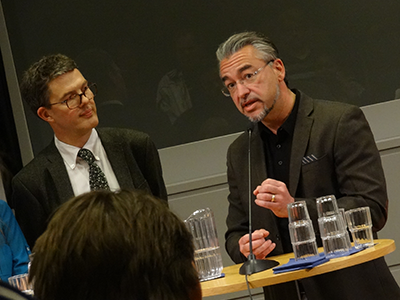I senaste numret av tidningen Sounds in Europe, nr 9 2014, är Skaps och ECSA:s ordförande Alfons Karabuda gästskribent. Läs här hans artikel ”Our Digital Agenda for Europe”.
Alfons Karabuda: Our Digital Agenda for Europe
Europe is standing on the threshold of a new cultural era. Given the right prerequisites, culture will not only continue to promote democratic liberties, but provide solutions to Europe’s economic and unemployment crisis.
Culture and creative innovators have always been at the heart of social development. The digital shift is no exception. Understanding the digital shift from a technical, technocratic perspective is not enough. A cultural, democratic perspective is needed in order to gain success.
That is why, during my presidency, ECSA, European Composer & Songwriter Alliance, and Skap, Swedish Society of Songwriters, Composers & Authors, have been promoting a digital agenda for music as part of the European and national digital agendas. We have been taking part in the work for a new directive on collective rights management and for a digital single market, and we will continue our involvement in the work for a harmonized copyright within the EU.
There are few questions as crucial to music creators within the music business as the digital shift and the on-going review of copyright rules. The work that is being done today, will set a completely new infrastructure for music, movies and television tomorrow. This is not something the music business, or the individual music creators, can leave to others to decide.
Music creators embrace new, digital ways of meeting their audience. The public expects full and immediate access to their favourite music. The European Commission finds a digital single market a central tool to revive European economy and turns to the creative sector for solutions.
Yes, we are standing on the threshold of a promising future for music in Europe.
Much is depending on those who create, perform and innovate in the music sector. They, and the conditions they work under, should be put in centre of a digital agenda for music. What happens when we add creative freedom of speech? Or when we add gender equality? When the different stakeholders start working closer with those at the heart of creation, and when those still outside the infrastructure are welcomed in?
It is not all about business. Creative rights are more than copyright. In the European perception of copyright, we talk of authors’ rights, consisting of economic rights and moral rights – focus being on economic rights in most stakeholders’ agendas, and definitely in the European Commission’s work for a digital single market.
Music is valuable to us all – but for very different reasons. Where YouTube thrives from its 90 per cent music content, a dictator somewhere feels threatened by the expressive impact of that same music. As expert to the UN Human Rights Council in producing the first ever UN report on right to freedom of artistic expression and creativity, I know the importance of the right to your own expression and the right to your own work.
Artistic freedom of expression and moral rights are two sides of the same coin. Therefore, moral rights cannot be disregarded in the on-going review of the EU copyright rules.
We are convinced diversity and gender equality are necessary perspectives not only for the digital discourse, but for success in the digital shift. To this end, ECSA develops its relations to IMC and EMC member organization Adkins Chiti: Donne in Musica, representing more than 43,000 professional women composers, songwriters, and creators of music, musicologists, musicians, researchers, practitioners, stakeholders and teachers, and carrying forward the “WIMUST” programme, for a new strategy for equal opportunities for women in music.
We believe it to be necessary to include music creators and performers in the digital agenda. Our work, music, is the base for all those businesses that are supposed to make the wheels of the digital single market turn. Our work creates value to all parts of the value-chain. In fact, without our work there would be no value-chain at all.
This is why we, as music creators, need to scrutinize digital agenda directions as we would any political one. Creative rights must be as much a part of the digital agenda for Europe as any market. To this end, I feel confident in the commitment of music creators, performers, musicians and all those working for musical diversity in Europe in form of the EMC, ECSA and Fondazione Adkins Chiti: Donne in Musica.
Standing on the threshold, we now have a window of opportunity to achieve change in the direction we need. Let us take advantage of this unique situation and form the European music landscape of tomorrow together. Music is of importance to the value-chains of digital services, to society at large and to democracy. This is the mission of our digital agenda for Europe.
An agenda looking out for music creators, performers and their audience. An agenda providing for innovators, entrepreneurs and their business. An agenda for a future of diversity in music.
Alfons Karabuda
[Publicerad i Sounds of Europe nr 9, 2014]
